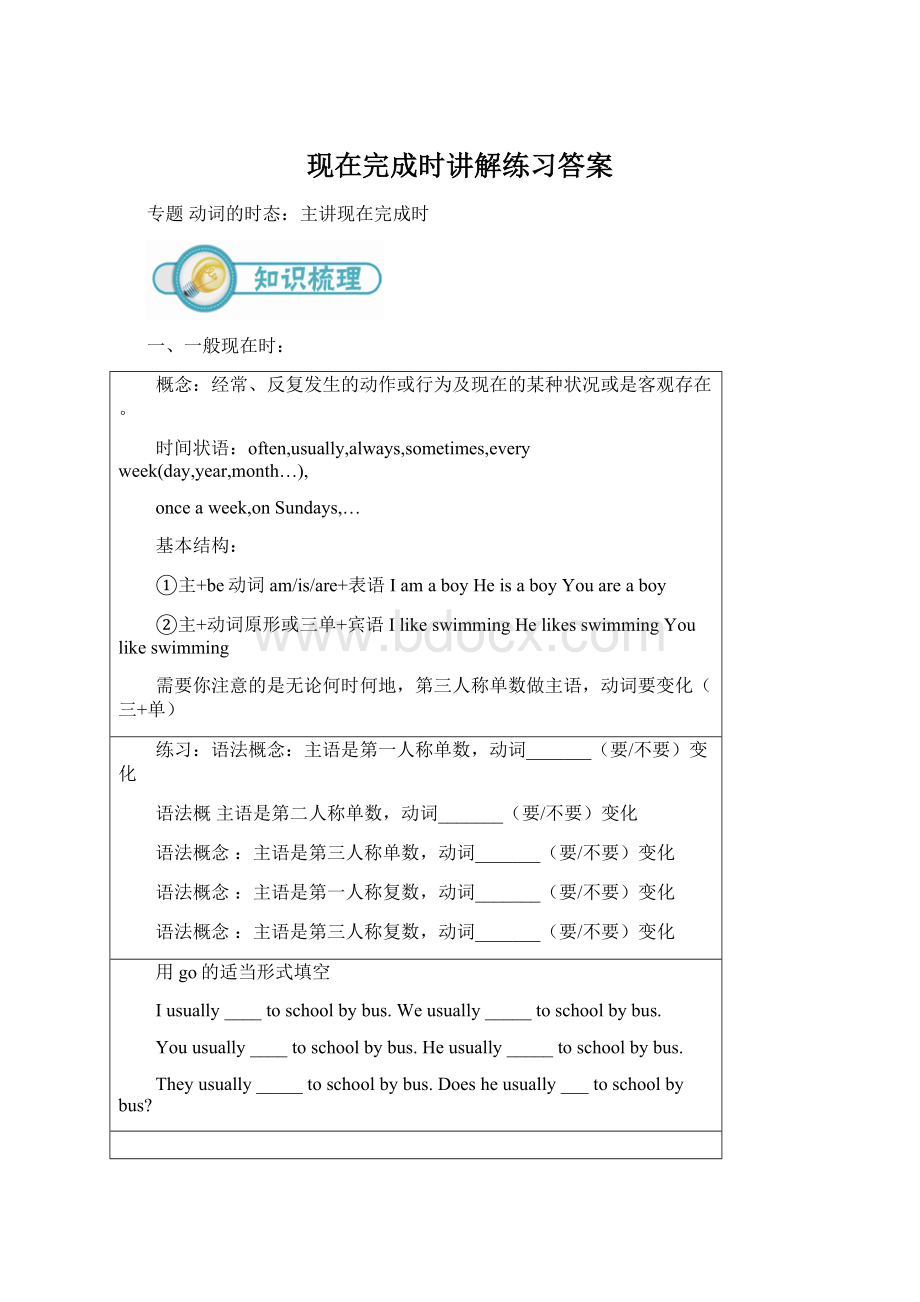现在完成时讲解练习答案.docx
《现在完成时讲解练习答案.docx》由会员分享,可在线阅读,更多相关《现在完成时讲解练习答案.docx(13页珍藏版)》请在冰豆网上搜索。

现在完成时讲解练习答案
专题动词的时态:
主讲现在完成时
一、一般现在时:
概念:
经常、反复发生的动作或行为及现在的某种状况或是客观存在。
时间状语:
often,usually,always,sometimes,everyweek(day,year,month…),
onceaweek,onSundays,…
基本结构:
①主+be动词am/is/are+表语IamaboyHeisaboyYouareaboy
②主+动词原形或三单+宾语IlikeswimmingHelikesswimmingYoulikeswimming
需要你注意的是无论何时何地,第三人称单数做主语,动词要变化(三+单)
练习:
语法概念:
主语是第一人称单数,动词_______(要/不要)变化
语法概主语是第二人称单数,动词_______(要/不要)变化
语法概念:
主语是第三人称单数,动词_______(要/不要)变化
语法概念:
主语是第一人称复数,动词_______(要/不要)变化
语法概念:
主语是第三人称复数,动词_______(要/不要)变化
用go的适当形式填空
Iusually____toschoolbybus.Weusually_____toschoolbybus.
Youusually____toschoolbybus.Heusually_____toschoolbybus.
Theyusually_____toschoolbybus.Doesheusually___toschoolbybus?
二、一般过去时
概念:
表示现阶段或说话时正在进行的动作及行为。
时间状语:
ago,yesterday,thedaybeforeyesterday,lastweek(year,night,month...),
in1989,justnow,attheageof5,oneday,longlongago,onceuponatime,…
基本结构:
①主+be过去式was/were+表Iwasastudent10yearsagoYouwereastudent10yearsago
②主+行为动词过去式+宾语IplayedcomputergamesyesterdayIdidmyhomeworkjustnow
动词的过去式一定要记全,这是基本
练习:
写出下列动词的过去式
build______choose_______bring______buy______feel_____hear______
sleep______keep_________think______leave_____throw______put______
1.PaulantItennisyesterday.HedidmuchbetterthanI.
A.playB.willplayC.playedD.areplaying
2.Whatdidyou____fordinnerlastnight.
A.eatsB.eatingC.eatD.ate
3.Hefelldownand______injuredyesterday.
A.getB.gotC.getsD.getting
4.I_____andtoldmymotherthatI______bysomebody.
A.cry;hitB.cried;washitC.cries;washitD.cried;hit
三、现在进行时
概念:
表示现阶段或说话时正在进行的动作及行为。
时间状语:
now,atthistime,thesedays,…其他提示词:
look,listen
基本结构:
主+be(am/is/are)+ving宾语Iamdoingmyhomework.Theyaredoingtheirhomework
注意某些动词要去e(大部分e不发音)某些动词要双写最后的字母(重读闭音节+辅元辅)
练习:
语法概念:
用be的正确形式填空
I____He_____She____You____They_____We____Boy____Boys_____
1.Jack is_____ with Jim .They are good____.
A. running friend; B. running; friends; C. running friends D. run; friends
2.The children are____ TV.
A. watch B. seeing C. watching D. reading
3.Look, the boy__________(run)fast
4.What are you doing?
----I_________(do) my homework.
5.____hedoinghishomeworknow?
6.the students; prepare for; an English test; now; (.) ____________________________________
7.我在看电视呢,没时间,一边儿去。
______________________________________________
四、一般将来时
概念:
表示将要发生的动作或存在的状态及打算、计划或准备做某事。
时间状语:
tomorrow, next day(week, month, year…),soon, the day after tomorrow
基本结构:
①主+be going to + do+宾语 Iamgoingtodomyhomework
②主+will+ do+宾语Iwilldomyhomework
注意不要看到begoing就以为是现在进行时;不存在willbegoingto这种说法
练习:
1.WhereareyougoingthisSunday?
____________
A.Igotothepark.B.Iwillgotothepark.C.IgoingtotheparkD.Iwillbegoingtothepark
2.明天我要去北京。
__________________________________
3.I;go;America;tomorrow;(.)___________________________________________
每种时态写出一句疑问句和否定句
上面时我们小学就学过的,没学好的自己检讨
时态的基本框架
时态
现在时
过去时
将来时
过去将来时
一般
一般现在时
一般过去时
一般将来时
过去将来时
进行
现在进行时
过去进行时
将来进行时
过去将来进行时
完成
现在完成时
过去完成时
将来完成时
过去将来完成时
完成进行
现在完成进行时
过去完成进行时
将来完成进行时
过去将来完成进行时
过去将来时概念:
立足于过去某一时刻,从过去看将来,常用于宾语从句中。
He said he would go to Beijing the next day.
ThereportsaidthatthefilmstarwouldcometoHenannextSunday.
过去进行时概念:
表示过去某段时间或某一时刻正在发生或进行的行为或动作。
When he came in, I was reading a newspaper.
At that time she was working in a PLA unit.
将来进行时概念:
表示将来某一时间正在进行的动作,或表示要在将来某一时间开始,并
继续下去的动作。
常用来表示询问、请求等。
This time next day they will be sitting in the cinema.
He won’t be coming to the party
现在完成时概念:
过去发生或已经完成的动作对现在造成的影响或结果,或从过去已经开始,持续到现在的动作或状态。
I've written an article.
The countryside has changed a lot in the past few years.
过去完成时概念:
以过去某个时间为标准,在此以前发生的动作或行为,或在过去某动作之前完成的行为,即“过去的过去”。
As soon as we got to the station, the train had left.
Hesaidthathehadfinishedthehomework.
现在完成进行时:
表示从过去某一时间开始一直延续到现在的动作。
这一动作可能刚刚开始,也可能仍在继续,并可能延续到将来。
I have been sitting here for an hour.
The children have been watching TV since six o'clock.
现在完成时
概念:
过去发生或已经完成的动作对现在造成的影响或结果,或从过去已经开始,持续到现在的动作或状态。
初二上册Unit5中的英英解释:
Weusethepresentperfecttensetotalkaboutthingsthathappenedinthepastbuthaveaconnectiontothepresentinsomeway.
发生在过去的事情和现在有联系
需要与之作出最大区分的一个时态就是过去时
过去时表示过去的一个动作,而且通常含有“过去时,而现在不是的”的含义。
比如,我以前是一名学生。
我以前是做翻译的。
Iwasastudent.Iwasatranslator.这种用一般过去时表示的就是以前是怎么的,但是现在已经不是了。
现在完成时表示过去的动作持续到现在,以前是这样,现在还是这样。
还可以表示过去的动作对现在造成的影响。
Ihavehadlunch.我吃过午餐了,隐含意思现在不饿;Ihavewateredtheflowers.我已经浇过花了,隐含意思你不需要再浇水了。
再次对比过去时和完成时所表达的意思
Ihavewateredtheflowers.我已经浇过花了。
→不用继续浇水了
Iwateredtheflowers.我浇过花了。
→只是说明我早上干了啥
基本结构
①肯定句:
主+have动词过去分词+宾语Ihavefinishedmyhomework.
②否定句:
主+have动词过去分词+宾语Ihaven’tfinishedmyhomework.
③疑问句:
Have+主语+动词过去分词+宾语Haveyoufinishedyourhomework?
主语是第三人称单数的时候,have改成has
动词的过去分词要记全,这是基础,过去分词跟过去式一样重要
什么情况下需要用到现在完成时?
1.有明显的提示词
与我们之前学过的时态一样,过去时可能会出现yesterday,last;现在进行时可能会出现now,look;将来时可能会出现tomorrow,next;一般现在时可能会出现usually,often。
现在完成时有时也有提示词,如already,yet,ever,never,before,for+时间段,since+时间点
IhavealreadybeentoGuangzhouthreetimes.我已经去过广州三次了。
Ihaven’tfinishedmyjobyet.我还没做完我的工作呢。
Ihaveneverseenthiskindofbirdbefore.我从来都没有见过这种鸟。
HaveyouevervisitedtheSummerPalace?
你参观过颐和园吗。
HehasbeeninBeijingfortenyears.他已经在北京呆了10年了。
Benhasneversleptsincelastnight.Ben自从昨晚就没睡过觉。
2.语境
He is not the most famous inventor in the world. However, his invention has changed our lives.
IcantraveltoanyplacesbecauseIhaveboughtacar.
基础选择题
1.I_______ a letter from him since he left.
A.didn't receive B.haven't got C.didn't have D.haven't heard
2.You've never seen such a wonderful film before,_______ ?
A.haven't you B.have you C.do you D.don't you
3. It hasbeen ten years _____ I last saw her.
A. after B. since C. for D. that
4.--Who will go to the station to meet Lorry?
--I will. I _____ her several times.
A. met B. have met C. had met D. will meet
5.Have you met Mr. Li ______?
A. just B. ago C.before D.a moment ago
答案:
BBBBC
CCBB
由第九题引入难点
6.Zhao Lan ______already ______in this school for two years .
A. was; studying B. will; study C. has; studied D. are; studying
7.We ______ Xiao Li since she was a little girl .
A. know B. had known C. have known D. knew
8.Harry Potter is a very nice film. I_______ it twice .
A. will see B. have seen C. saw D.see
9.--____ you ever ____ to the US?
-- Yes, twice.
A. Have, gone B. Have, been C, Do, go D. were, going
已经完成的动作:
过去所做的事情对现在造成一定的影响
现在完成时的难点
还未完成的动作:
过去所做的事情一直延续到现在
1.现在完成时的"完成用法"
现在完成时的"完成用法"指的是动作发生在过去某一时刻并已结束,但该动作对现在产生了影响,与现在情况具有因果关系。
例如:
He has turned off the light.他已把灯关了。
(动作结束于过去,说明了是现在的情况--灯现在不亮了。
)
现在完成时"完成用法"的特点是动作不延续,即瞬间动词,因此,该时态只能与表示不定的过去时间状语(如:
already,yet,before,recently等)、频度时间状语(如:
never,ever,once等)、包括现在时刻在内的时间状语(如:
this morning / month /year...,today等)连用。
例如:
Have you found your pen yet?
你已找到你的钢笔了吗?
2.现在完成时的"未完成用法"
现在完成时的"未完成用法"指的是动作开始于过去某一时刻,一直延续到现在,或可能还要继续下去。
例如:
He has lived here since 1978.自从1978年以来,他一直住在这儿。
(动作起始于1978年,一直住到现在,可能还要继续住下去。
)
I have been in the army for more than 5 years.我在部队已经呆了五年多了。
(动作开始于5年前,一直延续至今,有可能还要继续下去。
)
此种用法的句中常需一个表示一段时间的状语(由since或for引导),或表示与现在时刻相连的时间状语(如:
up to now,so far到目前为止)等。
例如:
I have heard nothing from him up to now.到目前为止我没有他的任何消息。
注意:
现在完成时的未完成用法只适用于延续性动词,不可用于终止性动词,即瞬间完成或延续时间很短的动词。
3.延续性动词和瞬间性动词的概念
英语中,动词按其动作发生的方式、动作发生过程的长短,可分为延续性动词和瞬间性动词。
延续性动词表示能够延续的动作,这种动作可以延续下去或产生持久影响。
如:
learn, work, stand, lie, know, walk, keep, have, wait, watch, sing, read, sleep, live, stay等。
瞬间性动词也称非延续性动词、瞬间动词或短暂性动词,表示不能延续的动作,这种动作发生后立即结束。
如open, close, finish, begin, come, go, arrive, reach, get to, leave, move, borrow,buy等。
It rained at eight yesterday morning..(误) rain为延续性动词,而at eight表示"点时间"。
上句可改为:
It began to rain at eight yesterday morning.(正)
Ihaveborrowedthebookfor2months.(误)borrow是“借”不能做借这个动作做了2个月吧
Ihavekeptthebookfor2months.(正)换成keep这个动词,保持,借到手了就拿了2个月
-When did you get to know Jack?
-Two years ago.
-Then you've known each other for more than two years. -That's right.
附加延迟动词与瞬间动词转换表(部分):
注意be的作用很大
瞬间动词
延续动词
瞬间动词
延续动词
puton
wear
end
beover
buy
have
join
bein
borrow
keep
gothere
bethere
become
be
getto/arrive/reach
bein
die
bedead
comeback
beback
moveto
livein
catchacold
haveacold
His father has died.die:
死亡,这个动作做完就没了,后面不能加延续的时间
His father has been dead for three years.bedead:
是死的,描述一种状态,持续三年
She has joined the Party/Leaguejoin:
加入,加入之后就不需要继续做加入这个动作了
She has been in the Party/ League for two months在党两个月,一种持续动作
She has been a Party/ League member for two months.是一名成员了,一种持续动作
The film has started/begun.start:
开始开始之后就进入内容了,动作已经结束
The film has been on/ lasted since 5 minutes ago.last:
持续电影播放了5分,持续了5分
1.What a nice dress!
How long _____ you _____ it?
--Just 2 weeks.
A. will, buy B. did, buy C. are, having D. have, had
2.Do you know Lydia very well?
--Yes, She and I _____ friends since we were very young.
A. have made B. have become C. have been D. have turned
3.I_________thebookformorethan3days.
A.lentB.havelentC.haveborrowedD.havekept
现在完成时的其中一个常考点
havebeento
去过
以前去过某地,现在已经不在那了,后常接次数
havegoneto
去了
现在到了某地,人还在那里待着
havebeenin
在
在某地呆了多长时间,后常接时间段
IhavebeentoBeijingtenyearago.IhavebeentoShanghaitwice.
MyfatherhasgonetoLondon,heisnothere.HehasgonetoAmerica.
IhavebeeninGuangzhouforsixyears.WehavebeeninChinaformorethanayear.
1.--____ you ever ____ to the US?
-- Yes, twice.
A. Have, gone B. Have, been C, Do, go D. were, going
2.I _________ Shanghai for three years